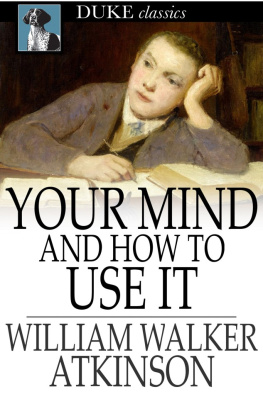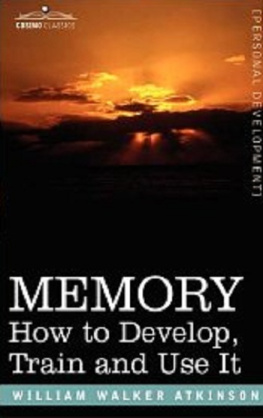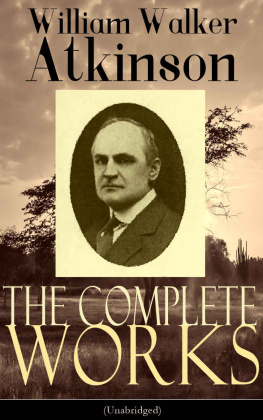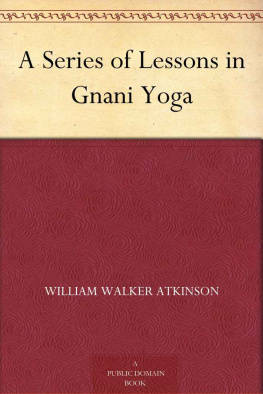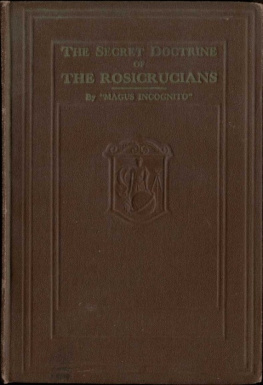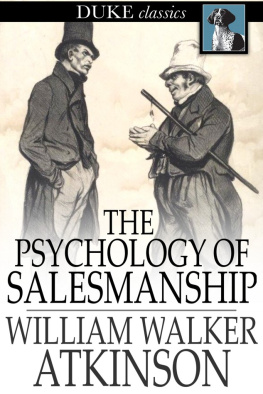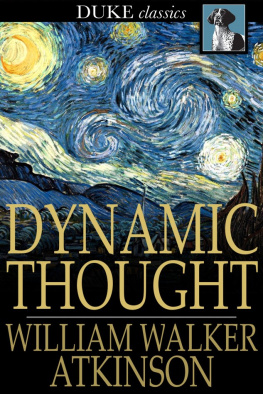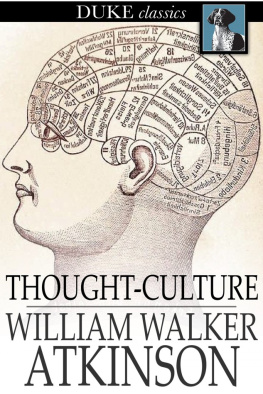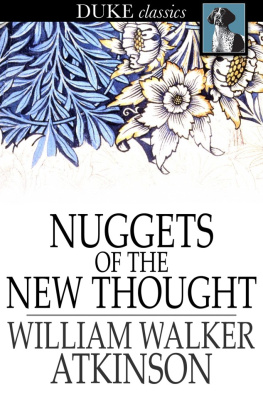William Walker Atkinson - The Secrets of Mind Power
Here you can read online William Walker Atkinson - The Secrets of Mind Power full text of the book (entire story) in english for free. Download pdf and epub, get meaning, cover and reviews about this ebook. publisher: St. Martins Publishing Group, genre: Religion. Description of the work, (preface) as well as reviews are available. Best literature library LitArk.com created for fans of good reading and offers a wide selection of genres:
Romance novel
Science fiction
Adventure
Detective
Science
History
Home and family
Prose
Art
Politics
Computer
Non-fiction
Religion
Business
Children
Humor
Choose a favorite category and find really read worthwhile books. Enjoy immersion in the world of imagination, feel the emotions of the characters or learn something new for yourself, make an fascinating discovery.

- Book:The Secrets of Mind Power
- Author:
- Publisher:St. Martins Publishing Group
- Genre:
- Rating:3 / 5
- Favourites:Add to favourites
- Your mark:
- 60
- 1
- 2
- 3
- 4
- 5
The Secrets of Mind Power: summary, description and annotation
We offer to read an annotation, description, summary or preface (depends on what the author of the book "The Secrets of Mind Power" wrote himself). If you haven't found the necessary information about the book — write in the comments, we will try to find it.
William Walker Atkinson: author's other books
Who wrote The Secrets of Mind Power? Find out the surname, the name of the author of the book and a list of all author's works by series.
The Secrets of Mind Power — read online for free the complete book (whole text) full work
Below is the text of the book, divided by pages. System saving the place of the last page read, allows you to conveniently read the book "The Secrets of Mind Power" online for free, without having to search again every time where you left off. Put a bookmark, and you can go to the page where you finished reading at any time.
Font size:
Interval:
Bookmark:
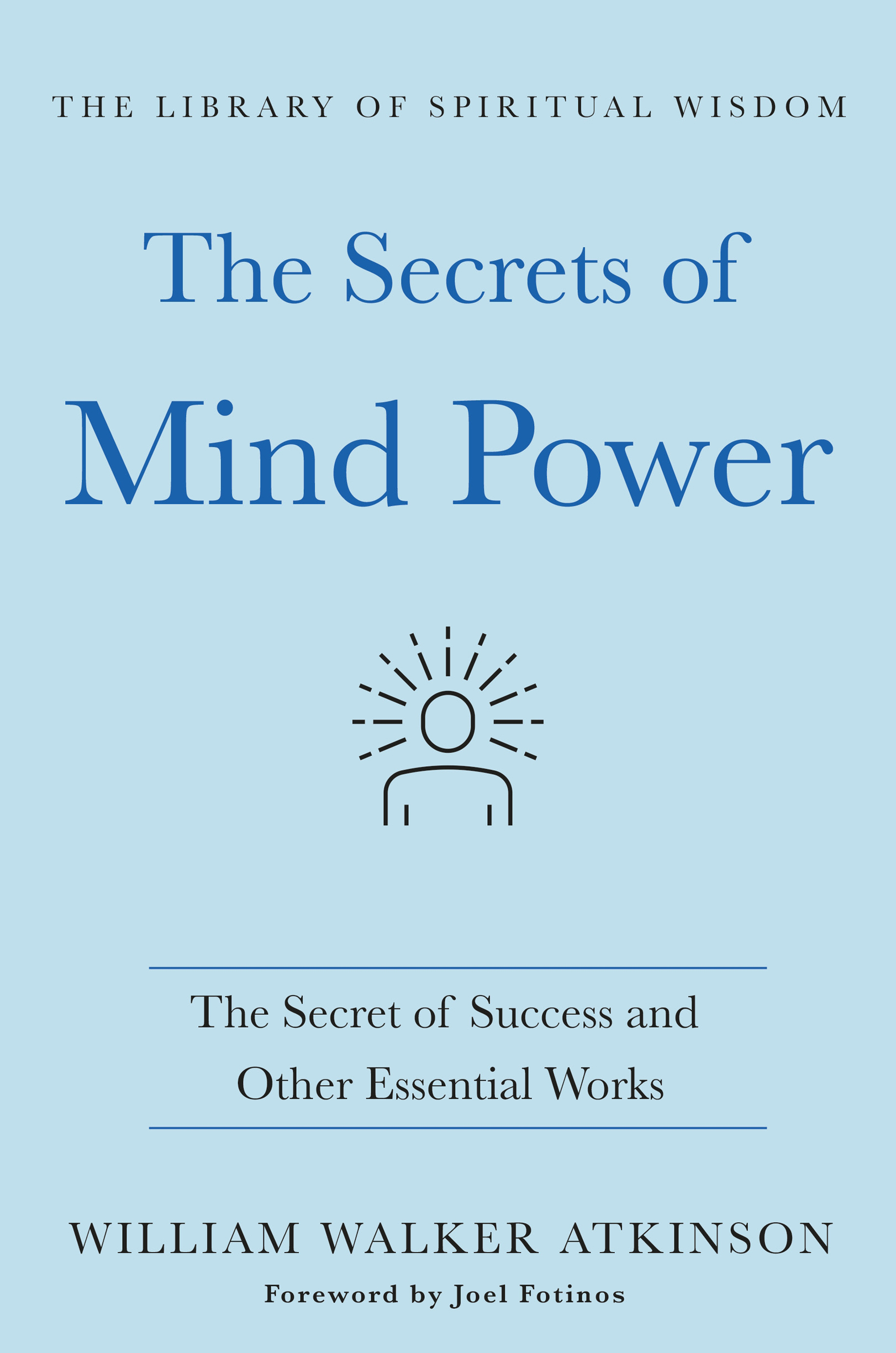

The author and publisher have provided this e-book to you for your personal use only. You may not make this e-book publicly available in any way. Copyright infringement is against the law. If you believe the copy of this e-book you are reading infringes on the authors copyright, please notify the publisher at: us.macmillanusa.com/piracy.
William Walker Atkinson might be the most famous and influential inspirational writer you have never heard of.
I say that because Atkinson at one time was extremely popular, but somehow while his ideas have continued to flourish, his name has been largely forgotten. With one exception (which Ill mention later), his books are difficult to find, relegated to print-on-demand status. It is my hope that this volumeone of the inaugural books in the Library of Spiritual Wisdom series, which was created to bring the spiritual classics of the 19th and 20th Centuries to modern readersbrings some of Atkinsons most potent and timeless books to many new readers. He deserves a wide readership.
Atkinson was a lawyer, author, publisher, editor, and speaker. Born in Baltimore in 1862, Atkinson married Margaret Foster Black, had two children, became a lawyer, and moved to Chicago. That last sentence sums up years of his life in just a few words, but there is much about Atkinson that we do not know.
What we do know, mostly through his articles and writings, is that at one point his life took a difficult turn. He suffered a physical and emotion breakdown, as well as financial ruin. It was then that he found books on mental healing. Chicago at that time was a hot spot for the fast-growing New Thought philosophy, the philosophy based on transcendentalism as well as mesmerism and mental science. He studied with two of New Thoughts most formidable and influential leaders, Helen Wilmans and Emma Curtis Hopkins.
Atkinsons mind, body, and finances were all healed using the ideas from New Thought. He began writing articles about his experiences and about the metaphysical ideas that he now embraced. And shortly after that, he began writing books.
He also began working with several New Thought magazines, including New Thought Magazine, Advanced Thought, and eventually Nautilus magazine, which was founded and headed by early New Thought publisher Elizabeth Towne.
Eventually he began to publish books through his own publishing companies, the Yogi Publication Society and Advance Thought Publishing Company.
Heres where his story gets interesting, at least to me. Atkinson was incredibly prolific, and he wrote many books about his main interests, which included mental science, New Thought, psychic studies, numerology, the occult, natural health and wellness, and also Eastern philosophy, especially Hinduism, which he had become interested in. During his lifetime, he wrote well over a hundred books, which is a remarkable achievement.
However, instead of just publishing them all under his own name, he evidently created a series of pseudonyms, each with a different emphasis. For example, the books under his own name dealt with mental sciences, the occult, divination, and spiritual success. His books with Eastern and Hindu influences were written under the name Swami Ramachakara. He also published under the names Swami Bhakta Vishita and Swami Panchadasi, and these books were largely about clairvoyance, psychic thought, and life after death. His pseudonym Theron Q. Dumont focused on mental power, self-improvement, self-confidence, memory, and concentration. The health and wellness titles were published under the name of Theodore Sheldon, and the esoteric studies, such as Rosicrucianism, were published with the name Magus Incognito. There were other pseudonyms as well.
Notice that I said he evidently published books with pseudonyms. He never revealed one way or another if he authored those, and in fact even created elaborate stories of who some of these authors were. However, there doesnt seem to be evidence of these other authors actually existing. Not to mention, those books all had the same feel as the books published under his own name. It is widely accepted that he was the author of the books under these pseudonyms.
His most famous pseudonym, was known as the Three Initiates, who authored a book that claimed to be of authentic Hermetic wisdom, called The Kybalion. This book ended up being his bestseller, the book that he is best known for today, though most readers of the book dont know that the name of the author is actually William Walker Atkinson. There is some question as to the authorship, whether he wrote the book by himself, or with others, or even at all, but careful study of The Kybalion reveals that there is a vast probability that Atkinson was the sole author of the book. (The Kybalion is available as a part of the Essential Wisdom Library series from St. Martins Essentials, with a foreword by me as well).
While his pseudonyms are fascinating, the books he wrote under his own name are equally fascinating.
In one of his earliest books, under his own name, he discussed the concept of the law of attraction, one of the first writers to use that term, which has become widely known and taught in recent years, through books such as The Secret, and those written by Wayne Dyer and others. Many of his other ideas are now commonplace as well, and some are still ahead of their time.
The ten books in this volumeeach original and completeshowcase a man with a brilliant mind and charismatic personality. While the language is of the times when he wrote them, his ideas are timely and practical and valuable. You can tell as you read these books that he truly wants to help readers improve their lives. They are written in a motivational, personal style, totally graspable and applicable for the modern reader.
Yes, some of the stories or examples are dated, but the ideas behind those examples transcend the time he wrote them. After all, Atkinson would be the first to tell us that he didnt invent these ideas, he only wrote about them in a way that made them understandable.
He was incredibly clear in his writing. Look at even the titles he used:
- Your Mind and How to Use It: A Manual of Practical Psychology
- The KeynoteI Can!
- The Art of Logical Thinking
- The Secret of the I AM
- Dynamic Thought, or the Law of Vibrant Energy
- Let a Little Sunshine In
- Practical Mind Influence
- Look Aloft!
- The Secret of Success
- The Hunger of the Soul
The reader can tell exactly what each book is about, and Atkinson more than delivers. His confidence in and love of the ideas in his books burst forth from every paragraph. Reading his books is more than instructional, it is joyful.
In Atkinsons later years, he become involved in the International New Thought Alliance, and in fact was their president at one point. He ran his publishing businesses, remained an active lawyer, popular speaker, and influential New Thought teacher.
He died in 1932, just shy of his 70th birthday. His publishing company continued to publish his books for decades, but otherwise he left behind no organization or center that taught his principles and ideas. Perhaps that is why his name isnt well known in this time. His books didnt have an author or organization to keep them fresh in the minds of readers. However, as you read his books, youll begin to see his ideas, from these books written more than a century ago, in todays current bestsellers. Whenever I notice it, I pause and smile, knowing that Atkinsons influence is still being felt today.
Font size:
Interval:
Bookmark:
Similar books «The Secrets of Mind Power»
Look at similar books to The Secrets of Mind Power. We have selected literature similar in name and meaning in the hope of providing readers with more options to find new, interesting, not yet read works.
Discussion, reviews of the book The Secrets of Mind Power and just readers' own opinions. Leave your comments, write what you think about the work, its meaning or the main characters. Specify what exactly you liked and what you didn't like, and why you think so.

